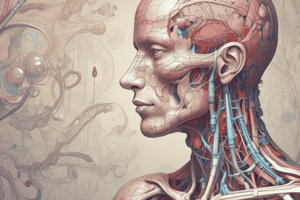Podcast
Questions and Answers
What is the role of the nervous tissues in the body?
What is the role of the nervous tissues in the body?
Conduct electrical signals and transmit information throughout the body.
How does the digestive system contribute to the body's nutrient absorption?
How does the digestive system contribute to the body's nutrient absorption?
It breaks down food into smaller molecules, which are then absorbed into the bloodstream for use by the body's cells.
What is the main function of the circulatory system?
What is the main function of the circulatory system?
Delivering nutrients and oxygen to cells throughout the body.
Flashcards are hidden until you start studying
Study Notes
The Fascinating World of Biology: An In-Depth Exploration of Physiology
Introduction
Biology, the science of life and living organisms, is a vast field that encompasses various branches and subtopics, including physiology. Physiology is the study of the functioning of living organisms, their cells, tissues, and organs. It focuses on the processes that occur within the body, such as digestion, metabolism, respiration, circulation, and other vital functions that keep us alive and well. In this article, we will delve into the intricacies of physiology, exploring its various aspects and the processes that underpin the function of our bodies.
The Building Blocks of Life: Cells and Tissues
Biology begins at the cellular level, where all living organisms are made up of billions of cells. Cells are the fundamental units of life, responsible for carrying out the functions of the organism. They are composed of various organelles, each with a specific role in maintaining cellular function. For example, the nucleus contains DNA, the genetic material that determines the traits of an organism, while mitochondria generate energy through cellular respiration.
Tissues, on the other hand, are groups of similar cells that work together to perform specific functions. There are four main types of tissues in the body:
- Epithelial tissues: Cover and protect organs and provide a barrier against external substances.
- Connective tissues: Provide support and attachment between different parts of the body.
- Muscle tissues: Facilitate movement and support the body's structure.
- Nervous tissues: Conduct electrical signals and transmit information throughout the body.
The Importance of Homeostasis
Homeostasis is the maintenance of a stable internal environment within the body, despite external changes. It is achieved through a complex interplay of systems and processes that work together to regulate various factors such as body temperature, fluid balance, and pH levels. For instance, the endocrine system, which includes hormones like insulin and cortisol, helps regulate metabolism and stress response, respectively.
The Digestive System: Breaking Down Nutrients
The digestive system is responsible for breaking down food into smaller molecules, which are then absorbed into the bloodstream for use by the body's cells. This process begins in the mouth, where enzymes in saliva break down carbohydrates. The food then moves through the esophagus, stomach, and small intestine, where additional enzymes and acids further break down the food.
The Circulatory System: Delivering Nutrients and Oxygen
The circulatory system, consisting of the heart, blood vessels, and blood, plays a crucial role in delivering nutrients and oxygen to cells throughout the body. The heart pumps blood, which carries these essential substances to the cells, while the blood vessels provide a network for the blood to travel through.
The Respiratory System: Exchanging Gases
The respiratory system is responsible for exchanging gases between the body and the environment. It includes the nose, throat, trachea, bronchi, and lungs. Oxygen from the air is taken in through the nose or mouth, then travels down the trachea and into the lungs, where it is absorbed into the bloodstream. Carbon dioxide, a waste product produced by the body's cells, is expelled from the body through the lungs when we exhale.
The Nervous System: Controlling and Coordinating
The nervous system, comprised of the brain, spinal cord, and nerves, is responsible for controlling and coordinating various body functions. It transmits electrical signals between different parts of the body, allowing us to sense and respond to our surroundings. The brain, the body's control center, interprets these signals and sends out commands to the muscles and organs to perform specific actions.
The Endocrine System: Regulating and Maintaining
The endocrine system, which includes glands such as the pancreas, thyroid, and adrenals, plays a crucial role in regulating and maintaining various body functions. It secretes hormones, which are chemical messengers that travel through the bloodstream to target cells, instructing them to perform specific tasks. For example, insulin, a hormone produced by the pancreas, helps regulate blood sugar levels.
Conclusion
Biology, and specifically the study of physiology, offers a fascinating glimpse into the inner workings of our bodies. By understanding the complex processes that occur within our cells, tissues, and organs, we can gain a deeper appreciation for the intricate machinery that keeps us alive and well. From the digestion of food to the exchange of gases, each process plays a crucial role in maintaining homeostasis and ensuring the proper functioning of the body. As we continue to explore the depths of biology, we can expect to uncover even more fascinating insights into the world around us.
Studying That Suits You
Use AI to generate personalized quizzes and flashcards to suit your learning preferences.




